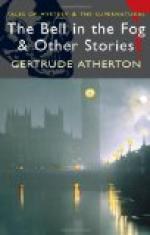Weigall reached the pool. A man in his evening clothes floated on it, his face turned towards a projecting rock over which his arm had fallen, upholding the body. The hand that had held the branch hung limply over the rock, its white reflection visible in the black water. Weigall plunged into the shallow pool, lifted Gifford in his arms and returned to the bank. He laid the body down and threw off his coat that he might be the freer to practise the methods of resuscitation. He was glad of the moment’s respite. The valiant life in the man might have been exhausted in that last struggle. He had not dared to look at his face, to put his ear to the heart. The hesitation lasted but a moment. There was no time to lose.
He turned to his prostrate friend. As he did so, something strange and disagreeable smote his senses. For a half-moment he did not appreciate its nature. Then his teeth clacked together, his feet, his outstretched arms pointed towards the woods. But he sprang to the side of the man and bent down and peered into his face. There was no face.
III
The Dead and the Countess
(Republished from the Smart Set)
It was an old cemetery, and they had been long dead. Those who died nowadays were put in the new burying-place on the hill, close to the Bois d’Amour and within sound of the bells that called the living to mass. But the little church where the mass was celebrated stood faithfully beside the older dead; a new church, indeed, had not been built in that forgotten corner of Finisterre for centuries, not since the calvary on its pile of stones had been raised in the tiny square, surrounded then, as now, perhaps, by gray naked cottages; not since the castle with its round tower, down on the river, had been erected for the Counts of Croisac. But the stone walls enclosing that ancient cemetery had been kept in good repair, and there were no weeds within, nor toppling headstones. It looked cold and gray and desolate, like all the cemeteries of Brittany, but it was made hideous neither by tawdry gewgaws nor the license of time.
And sometimes it was close to a picture of beauty. When the village celebrated its yearly pardon, a great procession came out of the church—priests in glittering robes, young men in their gala costume of black and silver, holding flashing standards aloft, and many maidens in flapping white head-dress and collar, black frocks and aprons flaunting with ribbons and lace. They marched, chanting, down the road beside the wall of the cemetery, where lay the generations that in their day had held the banners and chanted the service of the pardon. For the dead were peasants and priests—the Croisacs had their burying-place in a hollow of the hills behind the castle—old men and women who had wept and died for the fishermen that had gone to the grande peche and returned no more, and now and again




